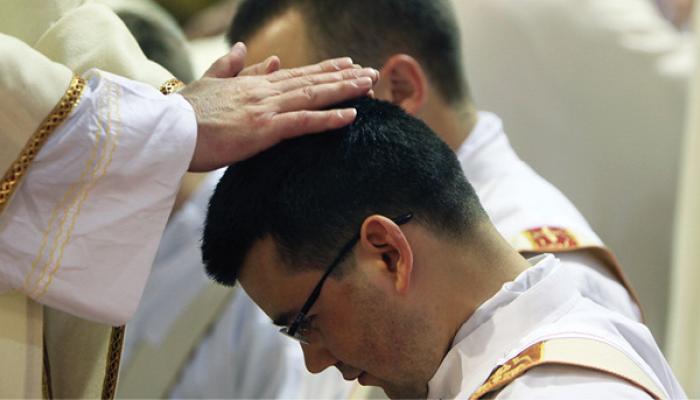
3.43 Pse Martesa është kaq e rëndësishme për të krishterët?
Zoti është zanafilla e çdo dashurie njerëzore, përfshirë këtu edhe dashurinë mes një burri dhe një gruaje që dëshirojnë të martohen. Martesa mes një burri të pagëzuar dhe një gruaje të pagëzuar është e çmueshme sepse Jezusi ka një vend të veçantë në marrëdhënien e tyre. Prandaj Jezusi e ngriti martesën si një sakrament.
Martesa ka tre elementë kryesorë:
1) Bashkëshortët formojnë një njësi;
2) Martesa është për të gjithë jetën dhe nuk mund të zhbëhet (Mk. 10:9) Mk. 10:9: Prandaj, çka bashkoi Hyji, njeriu të mos guxojë ta ndajë!;
3) Nga martesa mund të lindin fëmijët, sipas urdhrit të Zotit për të qenë të frytshëm (Zan. 1:28) Zan. 1:28: Hyji i bekoi dhe u tha: “Shtohuni e shumohuni e mbusheni tokën dhe sundojeni atë! Bëhuni zotëruesit e peshqve të detit, të shpendëve të qiellit dhe të çdo gjallese që lëviz përmbi tokë”!.
Për çfarë qëllimi Hyji e ka themeluar Martesën?
Bashkimi martesor i burrit dhe i gruas, i themeluar dhe i strukturuar me ligje të vendosura prej vetë Krijuesit, si rrjedhim i natyrës së vet, priret kah bashkësia, kah e mira e bashkëshortëve, si edhe kah lindja dhe edukimi i fëmijëve. Bashkimi martesor, sipas planit zanafillor hyjnor, është i pazgjidhshëm, siç e thekson vetë Jezu Krishti: “Çka bashkoi Hyji, njeriu mos guxojë të [ta] ndajë” (Mk 10,9). [KKKP 338]
Çfarë mëson Besëlidhja e Vjetër mbi Martesën?
Hyji, sidomos përmes mësimeve të Ligjit dhe të Profetëve, e ndihmon popullin e Vet që të bëhet gjithnjë e më i vetëdijshëm për njësinë dhe pazgjidhshmërinë e Martesës. Besëlidhja martesore e Hyjit me Izraelin përgatit dhe parafiguron Besëlidhjen e Re të kryer prej Birit të Hyjit, Jezu Krishtit, me nusen e Vet, Kishën. [KKKP 340]
Cila është risia që Krishti i dhuron Martesës?
Jezu Krishti, jo vetëm përtërin rregullin fillestar të dashur prej Hyjit, por dhuron edhe hirin për ta jetuar Martesën në dinjitetin e ri të Sakramentit, që është shenjë e dashurisë së Vet martesore për Kishën: “Ju, o burra, doni gratë tuaja sikurse Krishti e ka dashur Kishën” (Ef 5, 25). [KKKP 341]
Çfarë kërkohet kur njeri prej të martuarve nuk është katolik?
Me qëllim që martesat e përziera (mes katolikut dhe të pagëzuarit jo katolik) të jenë të lejueshme, nevojitet leja e autoritetit kishtar. Martesat me persona të besimit tjetër (mes katolikut dhe jo të pagëzuarit) për të qenë të vlefshme, kanë nevojë për një lirim [dispencë] nga kjo gjë. Sidoqoftë, është thelbësore që bashkëshortët mos ta përjashtojnë pranimin e qëllimeve dhe të veçorive thelbësore të Martesës dhe që bashkëshorti katolik t’i pranojë detyrimet, të njohura edhe prej bashkëshortit tjetër, për ta ruajtur fenë dhe për të siguruar Pagëzimin dhe edukimin katolik të fëmijëve. [KKKP 345]
Why did God dispose man and woman for each other?
God disposed man and woman for each other so that they might be “no longer two but one” (Mt 19:6). In this way they are to live in love, be fruitful, and thus become a sign of God himself, who is nothing but overflowing love. [Youcat 260]
What is necessary for a Christian, sacramental marriage?
A sacramental marriage has three necessary elements: (a) free consent, (b) the affirmation of a lifelong, exclusive union, and (c) openness to children. The most profound thing about a Christian marriage, however, is the couple’s knowledge: “We are a living image of the love between Christ and the Church.”
The requirement of unity and indissolubility is directed in the first place against polygamy, which Christianity views as a fundamental offense against charity and human rights; it is also directed against what could be called “successive polygamy”, a series of non-binding love affairs that never arrive at one, great, irrevocable commitment. The requirement of marital fidelity entails a willingness to enter a lifelong union, which excludes affairs outside the marriage. The requirement of openness to fertility means that the Christian married couple are willing to accept any children that God may send them. Couples who remain childless are called by God to become “fruitful” in some other way. A marriage in which one of these elements is excluded at the marriage ceremony is not valid. [Youcat 262]
Why is marriage indissoluble?
Marriage is triply indissoluble: first, because the essence of love is mutual self-giving without reservation; second, because it is an image of God’s unconditional faithfulness to his creation; and third, because it represents Christ’s devotion to his Church, even unto death on the Cross.
At a time when 50 percent of marriages in many places end in divorce, every marriage that lasts is a great sign—ultimately a sign for God. On this earth, where so much is relative, people ought to believe in God, who alone is absolute. That is why everything that is not relative is so important: someone who speaks the truth absolutely or is absolutely loyal. Absolute fidelity in marriage is not so much a human achievement as it is a testimony to the faithfulness of God, who is there even when we betray or forget him in so many ways. To be married in the Church means to rely more on God’s help than on one’s own resources of love. [Youcat 263]
Are all people called to marriage?
Not everyone is called to marriage. Even people who live alone can have fulfillment in life. To many of them Jesus shows a special way; he invites them to remain unmarried “for the sake of the kingdom of heaven” (Mt 19:12).
Many people who live alone suffer from loneliness, which they perceive only as a lack and a disadvantage. Yet a person who does not have to care for a spouse or a family also enjoys freedom and independence and has time to do meaningful and important things that a married person would never get to. Maybe it is God’s will that he should care for people for whom no one else cares. Not uncommonly God even calls such a person to be especially close to him. This is the case when one senses a desire to renounce marriage “for the sake of the kingdom of heaven”. Of course a Christian vocation can never mean despising marriage or sexuality. Voluntary celibacy can be practiced only in love and out of love, as a powerful sign that God is more important than anything else. The unmarried person renounces a sexual relationship but not love; full of longing he goes out to meet Christ the bridegroom who is coming (Mt 25:6). [Youcat 265]
How is a Church wedding celebrated?
As a rule a wedding must take place publicly. The bride and bridegroom are questioned as to their intention to marry. The priest or the deacon blesses their rings. The bride and bridegroom exchange rings and mutually promise “to be true in good times and in bad, in sickness and in health” and vow to each other: “I will love you and honor you all the days of my life.” The celebrant ratifies the wedding and administers the blessing.
Here are some excerpts from one form of the Rite of Catholic Marriage: Celebrant: N. and N., have you come here freely and without reservation to give yourselves to each other in marriage?” Bride and bridegroom: “Yes.” Celebrant: “Will you love and honor each other as man and wife for the rest of your lives?” Bride and bridegroom: “Yes.” The celebrant then asks the bride and bridegroom together the following questions. “Will you accept children lovingly from God and bring them up according to the law of Christ and his Church?” Bride and bridegroom: “Yes.” [Youcat 266]
May a husband and wife who are always fighting get a divorce?
The Church has great respect for the ability of a person to keep a promise and to bind himself in lifelong fidelity. She takes people at their word. Every marriage can be endangered by crises. Talking things over together, prayer (together), and often therapeutic counseling as well can open up ways out of the crisis. Above all, remembering that in a sacramental marriage there is always a third party to the bond—Christ—can kindle hope again and again. Someone for whom marriage has become unbearable, however, or who may even be exposed to spiritual or physical violence, may divorce. This is called a “separation from bed and board”, about which the Church must be notified. In these cases, even though the common life is broken off, the marriage remains valid.
Indeed, there are also cases in which the crisis in a marriage ultimately goes back to the fact that one spouse or both was not eligible at the time of the wedding or did not fully consent to the marriage. Then the marriage is invalid in the canonical (legal) sense. In such cases an annulment procedure can be introduced at the diocesan tribunal. [Youcat 269]
Në martesë, le të jenë këto bekime martesore qëllimet e dashurisë sonë - pasardhës, besnikëri, lidhje sakramentale. Pasardhës, jo vetëm të lindë, por të rilindë sërish... Besnikëria, jo ashtu siç e vëzhgojnë edhe jobesimtarët përkundrejt njëri-tjetrit, në dashurinë e tyre të zjarrtë për mishin... Lidhja sakramentale, përsëri, e cila nuk humbet as nga divorci as nga shkelja e kurorës, duhet ruajtur nga burri dhe gruaja me harmoni dhe dëlirësi. [Shën Agustini, Mbi martesën dhe epshin, Bk. 1, Kapitulli 11 (ML 44, 424)]





